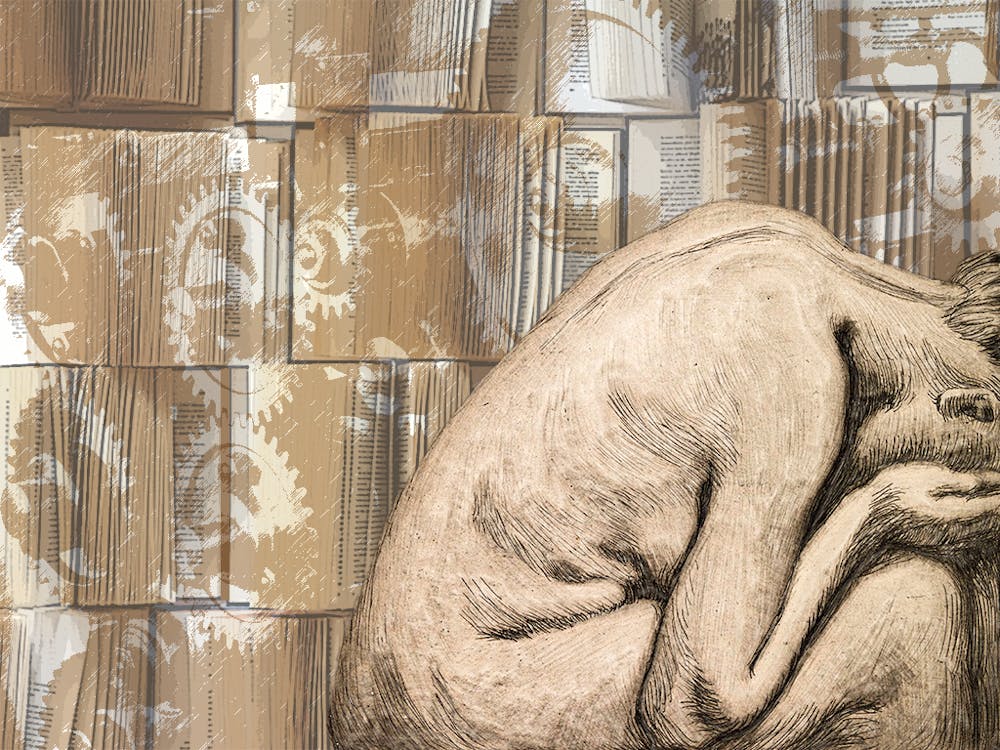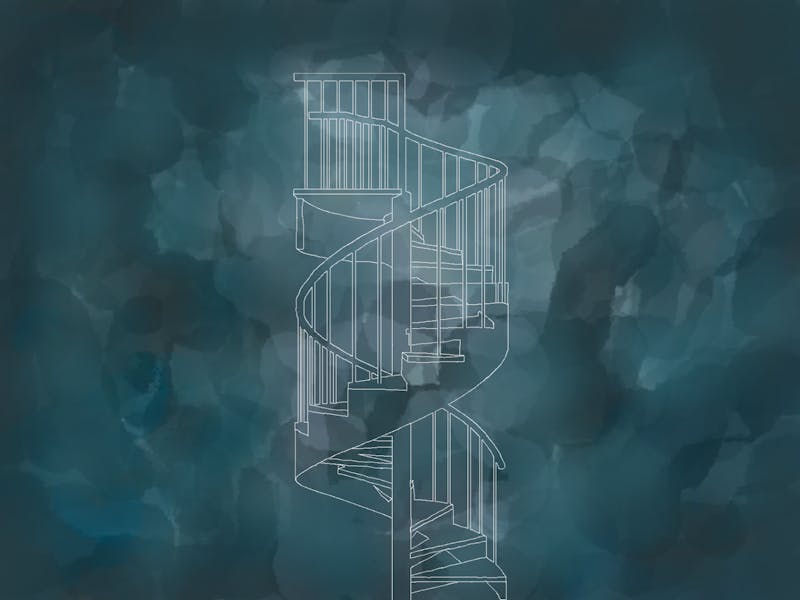Death is inconvenient. It creeps up your spine, nips at your ankles, settles at the bottom of your stomach. It doesn’t wait for you, for there is no right time, no perfect place, for death. For me, death came on a Wednesday afternoon. My father passed away early that morning, but my mother wanted to tell me in person. He lived an extra few hours in my memory. Grief doesn’t seem like a heavy word until you’ve felt it, and that night, I was Atlas. The weight of the word fell on my shoulders, caked my skin with mourning sunrise. It was the dawn of a new day, one my father wouldn’t see.
Looking back, it was kind of funny. He’d been sick for a few months, in and out of the hospital, but we never thought it’d be fatal. I visited for my birthday near the end of September, had to celebrate with him in a hospital bed, his room on the third floor. Then I saw him for a day during fall break. He was home by then. He said he felt better. He wanted to cook me dinner; he wanted to cook me breakfast. He made me pancakes, and when I left my jacket, he put it on the coat rack so that I could pick it up when I came back for Thanksgiving. I never found that jacket. It wasn’t in the house when we went to pack it up. I’d like to think he took it with him, that he grabbed it when the paramedics came, that he died with it holding his hand.
So, if there’s anything I’ve learned in the past year, it’s that death is inconvenient.
Because my dad died on a Wednesday afternoon at the tail end of October during my freshman year of college, I could only grieve so much, could only hold so much. There was a four-day countdown in my head, a self-inflicted time limit for my grief. I had a quiz due the next day, an exam due on Friday.
I don’t think I really got a chance to let any of it settle. For me, there was an unspoken rule that education stops for no one. It’s interwoven with time; it always moves forward, always slithers past things like death and tragedy. Just like death, the future does not wait for you. Nothing seems to wait for you. The world did not stop when my father died. That frightened me.
There’s a reason it's called the academic machine. There’s no real room for much else, not if you want the grades, the clubs, the experience you need to get that job you dream of. I had a plan—a plan to go to college, to graduate, to publish a book, one my father could actually read. I’ll still do all those things, but he won’t be there anymore. He’ll never read any of my books. Now, he’ll only be a dedication.
It’s stuff like this (the deep in your gut, stuck to your skull kind of introspection) that made me realize something: I simply swallowed my grief. I never had a chance to digest it. Even now, part of me still can’t conceptualize the fact that he’s gone, and I truly believe it’s because he’s still there. I never let him leave. I couldn’t. I had a test on Friday.
I couldn’t think about the paranoia, how I used to wonder what it would feel like to lose a parent. I spent a whole year with this irrational thought that my mother would die on the highway, that my father would fall asleep and never wake up. And then it came true. It actually came true. But there was homework due on Sunday.
I couldn’t think about how much I hated him or how much I loved him or how much he hurt us. Because my father was not a bad man but he wasn’t a good one either. We had problems (me and my dad, my brother and my dad, my mother and my dad). He always seemed to be the cause, the ground zero for family drama. But then he died an incomplete man, an unfinished man. We had too much to fix for him to die like that. There were too many things I couldn’t tell him and he couldn’t tell me. But I had class on Monday.
I couldn’t think about my brother and my mother and the stepfather he was just getting to know and the dog that he loved that we couldn’t keep—I lost her, for she too was inconvenient. Too big and too wild, a product of circumstance. I had no room to grieve for sweet Delilah, not when my father was dead and she wasn’t. Not when I had to get my degree.
For me, school is the only thing I can count on. I’ve spent the majority of my life in school; I was practically conditioned to it. It was consistent when everything else seemed to keep falling apart. So, I clung. I clung to what I knew how to do, knew how to handle, knew how to control. For almost fifteen years, my grades have been the only thing I have to show for myself, the only thing that makes me something. In my head, all that pressure, the years I’ve felt stuck between a rock and a hard place, is all to make something beautiful: a diamond that’s worth something. But education has become an assembly line of ideas, a pass and go of theory, a quantity over quality production. It’s a machine; it can’t consume something like grief. There’s no coding for grief, no setting for sorrow. So, it keeps going and going and going until you either stop or let it take you with it.
But maybe it’s just me. Maybe I let my education take advantage of me. One of my professors asked me something that I still think about from time to time. It was a handful of days after my father's passing; I went to him after class, told him what happened, and he asked me, “Why are you here?” He seemed genuinely caught off guard, like I had more time than I thought. It’s such a simple question, and yet, I didn’t have an answer. Perhaps it’s the kind of question that’s meant to go unanswered. Even so, I still ask it every single day. Why am I here? Why am I here when my father isn't? Why am I here when I could be with my mother, my brother, my family who could die in their sleep, on a Wednesday afternoon?
Grief is impossible to navigate. It’s the kind of thing that takes everything from you. Education acts the same way. You must give everything to grief, and you must give everything to the academic machine. It’s impossible to split it both ways. It’s like cutting a fifty-dollar bill in half and expecting it to matter—you only get paper.
So, which do you choose? What black hole do you let consume you? I chose something I’m used to, something I’ve already sacrificed almost fifteen years of my life to. For I am a dog, one that does not learn new tricks, that sits at the foot of a bed I can’t climb. Grief was new, still is new, and anything new is something to be feared, something to run from. And that’s what I did. I ran from one beast to another, chose the bear over the snake. I buried my head in textbooks to drown out the church bells, wrote essays in place of elegies. The time I had left was filled with friends, filled with family, and in late night pockets of spare-change time, I would mourn what I could before morning. Fall turned to winter turned to spring turned to summer. And with summer came time—time to mourn, time to grieve, time to look around and see someone missing.
We threw my father’s ashes on a beach, coated the sand in white flakes of father. But I couldn’t cry. So, I only laughed. It was eleven o’clock on a Wednesday morning. We drove the Jeep two miles up the shore near the dunes where my uncle—his baby brother—and my grandmother—his mother—lay somewhere under sand, entangled in sea oats. I spent the better half of the year drowning myself in my education rather than drowning myself in my father’s grief. At that point, I think I forgot how to mourn. So, I laughed. In a way, it feels like I failed him. But, I guess he failed me too.
Grief is eternal. It’s always going to linger; it sits with you in class, gnaws at your skin and bone and heart and soul, feeds off memory. Grief will always be there, but sometimes you just forget how to grieve. It feels like there should be some kind of rulebook, a step-by-step guide. And maybe there is and I just missed it. And maybe there isn’t, and I just needed one. No one taught me how to grieve. I simply learned to ignore it.
You can’t define grief until you’ve lived it, until you’ve run away from it, until it finds you on a Wednesday afternoon.



